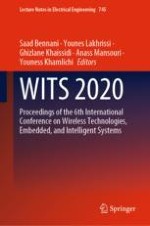2022 | OriginalPaper | Chapter
Towards the Implementation of Smartphone-Based Self-testing of COVID-19 Using AI
Authors : Hajar Saikouk, Chakib Alaoui, Achraf Berrajaa
Published in: WITS 2020
Publisher: Springer Singapore
Activate our intelligent search to find suitable subject content or patents.
Select sections of text to find matching patents with Artificial Intelligence. powered by
Select sections of text to find additional relevant content using AI-assisted search. powered by
